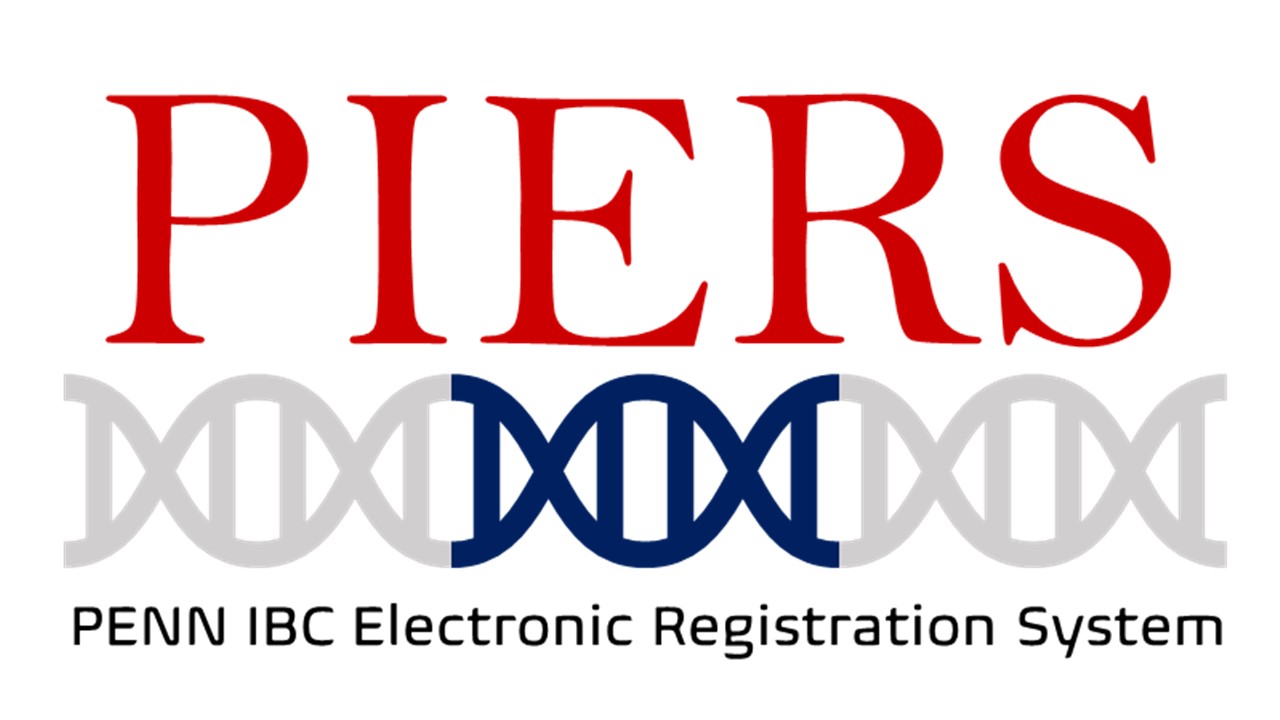Last Revised: April 18, 2024

All work with recombinant or synthetic Nucleic Acids (rsNA), and/or novel gene editing technologies using rsNA, must comply with the NIH Guidelines for Research Involving Recombinant or Synthetic Nucleic Acid Molecules. The generation and use of rsNA must be registered with the Institutional Biosafety Committee (IBC).
 New and 3-year renewal IBC registrations must be submitted through Penn IBC Electronic Registration System (PIERS). Amendments made to registrations approved in 2021 must also be submitted through PIERS. Amendments made to registrations approved in 2018, 2019, and 2020 must be made by submitting the downloadable form found below.
New and 3-year renewal IBC registrations must be submitted through Penn IBC Electronic Registration System (PIERS). Amendments made to registrations approved in 2021 must also be submitted through PIERS. Amendments made to registrations approved in 2018, 2019, and 2020 must be made by submitting the downloadable form found below.
-
For new and 3-year renewal IBC registrations, log into PIERS to start a new registration. Registration pre-review and full IBC review is completed through the website.
-
Amendments to registrations approved in 2021 or later must be made through PIERS.
-
For amendments made to registrations approved in 2020 and before, download and complete the IBC Amendment Form using Microsoft Word. Handwritten forms are not accepted and will be returned. A signature must be provided by the Principal Investigator.
-
Submit the completed amendment forms electronically to biosafety@lists.upenn.edu.
-
IBC registrations must be renewed every three years while work is ongoing. Amendments must be submitted when changes or additions to current IBC registrations are needed.
-
If you require guidance for filling out the Penn rsNA registration form, please contact a Biosafety Officer at 215-898-4453.
-
Recombinant or Synthetic Nucleic Acid Guidelines - EHRS Training is required for all personnel handling rsNA material every three years.
-
All personnel must complete training prior to registration or amendment approval.
-
Recombinant or Synthetic Nucleic Acid Guidelines - EHRS Training is available online through Workday Learning.
All projects involving recombinant or synthetic nucleic acid molecules and/or gene editing technology must be reviewed and approved by the Institutional Biosafety Committee (IBC). Work requiring IBC review and registration includes but is not limited to:
- Use and/or generation of viral vectors (e.g., lentivirus, retrovirus, adenovirus, adeno-associated virus)
- Use of CRISPR or other gene editing technologies
- Use and administration of modified cells in animals
- Use and administration of modified microorganisms in animals
- Expression of plasmids in animals
- Use of recombinant viruses and other pathogenic (RG2-4) microorganisms and experiments with them in animals
- Experiments with recombinant influenza virus (Section III-D-7)
- Gene transfer experiments in companion and privately-owned animals
- Generating transgenic animals (e.g., rodents, ants, fish, nematodes, frogs, fruit flies, other insects)
- Crossing transgenic animals, except for mice
- Experiments with non-pathogenic (RG1) microorganisms that are not exempted by Section III-F, Appendix C (e.g., use of baculovirus for protein expression, experiments with bacteriophage for phage display, use of Pichia pastoris for protein expression)
- Experiments with modified cells that contains greater than one-half of a viral genome
- Experiments with a defective virus in the presence of a helper virus (Section III-D-3)
- Experiments with genes from RG3 or RG4 agents (in prokaryotic or lower eukaryotic cells, or as mRNA vaccine)
- Cloning and expression of toxin molecules (also requires NIH-OSP approval if meets Section III-B requirements)
- Large-scale production of recombinant material (equal or greater than 10L in a vessel)
- Human Gene Transfer experiments
- Use and/or Generation of transgenic plants
- Crossing transgenic plants
- Use and/or administration of modified organisms in plants
- Experiments that meet the 7 experiments of concern under DURC even though the experiments do not meet DURC criteria (may meet Section III-A, e.g., deliberate transfer of drug resistance)
- Enhances the harmful consequences of the agent or toxin.
- Disrupts immunity or effectiveness of an immunization against the agent or toxin without clinical and/or agricultural justification.
- Confers to the agent or toxin resistance to clinically and/or agriculturally useful prophylactic or therapeutic interventions against that agent or toxin or facilitates their ability to evade detection methodologies.
- Increases the stability, transmissibility or the ability to disseminate the agent or toxin.
- Alters the host range or tropism of the agent or toxin.
- Enhances the susceptibility of a host population to the agent or toxin.
- Generates or reconstitutes an eradicated or extinct agent or toxin listed in the definition of DURC Agents
Common exempt work includes:
- Modified cells for tissue culture work only
- Plasmids expressed in tissue culture only
- Modified E. coli K-12 strains
- siRNA, shRNA, miRNA
If you are unsure if your research requires IBC review, please contact a Biosafety Officer at 215-898-4453.
The Penn IBC is now accepting IBC registrations through Penn IBC Electronic Registration System (PIERS). The following guidance documents are included to help you navigate and submit IBC registrations and amendments through PIERS.
-
Guidance for Reviewing and Addressing Pre-review Comments (pdf)
-
Additional Guidance for Creating and Completing an IBC Registration in PIERS (pdf)
-
How to Write the Title and Project Description for the IBC Registration (pdf)
-
Guidance for Completing an IBC Registration for Insect Labs (pdf)
-
If you require additional guidance for working in PIERS, please contact a Biosafety Officer at 215-898-4453.
NIH Office of Science Policy (OSP)
NIH Guidelines for Research Involving Recombinant or Synthetic Nucleic Acid Molecules
Biosafety Considerations for Research with Lentiviral Vectors
When do I need to register my work with the Institutional Biosafety Committee?
Disposal of Transgenic Animals (pdf)
Working Safely with Lentiviruses (pdf)